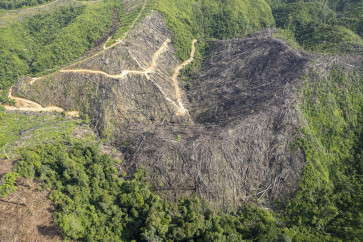Popular Reads
Top Results
Can't find what you're looking for?
View all search resultsPopular Reads
Top Results
Can't find what you're looking for?
View all search resultsJokowi to stop rice imports within two years
Leader of the pack: President Joko 'Jokowi' Widodo (center front) launches the groundbreaking ceremony for the construction of a concrete wall of an irrigation facility in Tallumae village, Watang Sidenreng district, Sidenreng Rappang regency in South Sulawesi, on Wednesday
Change text size
Gift Premium Articles
to Anyone
L
span class="caption">Leader of the pack: President Joko 'Jokowi' Widodo (center front) launches the groundbreaking ceremony for the construction of a concrete wall of an irrigation facility in Tallumae village, Watang Sidenreng district, Sidenreng Rappang regency in South Sulawesi, on Wednesday. The facility will regulate water from Sidenreng Rappang regency to Wajo regency. JP/Andi Hajramurni
President Joko 'Jokowi' Widodo is targeting the cessation of the rice import program within the next two years as the domestic product would be able to satisfy demand.
Jokowi revealed this after a groundbreaking ceremony for the rehabilitation of the irrigation facility in Tallumae subdistrict, Watang Sidenreng district, Sidenreng Rappang (Sidrap) regency, South Sulawesi, some 200 kilometers from the provincial capital of Makassar.
'In approximately the second year, rice imports will have stopped,' Jokowi said.
Also in the President's entourage were First Lady Iriana, Agriculture Minister Amran Sulaiman, Public Works and Public Housing Minister Basuki Hadimuljono and South Sulawesi Governor Syahrul YasinLimpo.
Jokowi said that rice production was expected to increase by up to 30 percent every year, so within the next three years, rice production would be abundant and food self-sufficiency realized.
He also expressed hope that self-sufficiency would be realized in corn and soybeans.
'These are the people's needs and will be made a priority,' Jokowi said.
To meet the target, Jokowi said, dams and irrigation facilities would be rehabilitated or constructed to ensure a smooth water supply to the rice fields. Supplies of seedlings and fertilizers, similarly, would also be increased.
He said within his 5-year term of office, he had targeted completing the development of 25 to 30 dams across the country. Development would be started in 2015, during which 11 new dams would be constructed.
'In January'February, we will develop five dams in Aceh, Banten, North Sulawesi, Kudus, Central Java and East Nusa Tenggara. From July'August, we will build six more dams,' Jokowi said.
He said Rp 8.2 trillion (US$656 million) had been allocated for the development of the 11 dams through the Public Works and Public Housing Ministry.
Apart from building new dams and irrigation facilities, Jokowi went on, improvements would also be made to damaged facilities.
Currently, he said, 52 percent of all dams and irrigation facilities had been damaged due to old age.
To realize this target, he added, some of the fuel subsidy would be allocated to the development and improvement of dams and irrigation facilities, as well as seed and fertilizer supplies.
The irrigation facility being visited Wednesday is one of those to be improved.
The facility, located across Tallumae and Belawa districts in Wajo regency, was built in 1971. Yet, so far, it has no concrete walls, thus reducing water flow as some of the water is absorbed into the walls.
The Rp 24 billion funding allocated to build the concrete walls for this dam has been taken from the 2014 and 2015 state budgets.
Head of Sidrap Water Resource Management Agency, Imran Abidin, said that the regency currently had four large irrigation facilities and 94 simple ones. However, not all the rice fields could benefit from the irrigation facilities.
He said Sidrap had over 48,000 hectares of rice fields, of which 31,000 hectares had technical irrigation facilities, 11,300 hectares had semi-technical irrigation and the remaining 6,000 hectares depended on rain water.
'We hope more irrigation facilities will be built here so that rain-fed rice fields will no longer have difficulty with water supplies,' Imran said.










